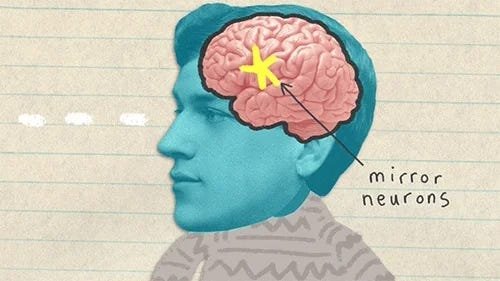How Understanding Mirror Neurons Can Make Us Better Writers

my notes ( ? )
It’s the early 1990s in Parma, Italy. Vittorio Gallese, a neuroscientist, along with his colleagues, has attached electrodes to a monkey’s brain (they probably got bored a lot in those labs).
It's just another day of observing the usual: whenever the monkey reaches for food, certain brain cells light up, making a distinctive crackling sound.
But this one fine day, something strange happens. “When I myself at one point extended my arm towards the nuts”, recalled Gallese, “the crackle occurred too—as if the monkey had moved. But it was only watching quietly.”
At first, they thought it was a glitch in their equipment. But the signal repeated every time the animal saw Gallese reaching for food. It was as if the monkey’s brain was in sync with the researcher’s brain.
“When an animal observes another's movements, the observer's neurons mirror the other's behavior. That's why we called them mirror neurons”, explained Gallese.
And just like that, with a reach for a snack and a curious monkey, a groundbreaking discovery was made.
More Than Just Monkey Business
As it turns out, we humans also possess these remarkable mirror neurons, and they play a crucial role in our ability to learn through observation and to empathize with others.
Have you ever wondered why you yawn when you see someone else yawn? Or why you find yourself tearing up during a heartbreaking scene in a movie, even though you know it's not real? That's your mirror neurons at work.
In humans, mirror neurons don't just fire when we see actions—they also activate when we read or hear about actions. For instance, read this sentence: “She scraped her long nails down the blackboard”. It’s very likely that you cringed (I mean, how could you not?).
That's because the same areas in your brain responsible for sensory and motor functions light up as if you were experiencing the action yourself.
This mechanism explains why we get so invested in stories, whether in books or on screen.
It's not just imagination – it's our mirror neurons allowing us to experience the world from someone else's perspective.
Brains in Sync: The Magic of Story
Now here’s where it gets really interesting.
Research by Uri Hasson at Princeton University has shown that during storytelling, something magical happens: the neural activity in the listener's brain begins to mirror that of the storyteller's brain.
As the story unfolds, the listener's brain synchronizes with the storyteller's, creating a shared experience that transcends the physical gap between them.
This “neural coupling” explains why we become so immersed in well-told stories.
When you read about a character fleeing from danger, your brain reacts as if you're the one being chased. When the character triumphs, your brain's reward center lights up, releasing a hit of dopamine as if you've achieved the victory yourself.
Lessons for Writers
- Show, Don't Just Tell: This age-old writing advice takes on new meaning in light of mirror neurons. By showing actions, emotions, and sensations rather than simply stating them, we give our readers' brains more to mirror and simulate.
Example: Instead of "Mike was angry," try "Mike's fists clenched, his knuckles whitening as he gritted his teeth."
- Engage the Senses: Appeal to the senses in your writing. The more sensory information you provide, the more fully you can engage your readers' mirror neuron system.
Example: "The coffee's aroma filled the room, its warmth seeping through the mug into her cold hands."
- Dive Deep into Character: The more we understand and convey our characters' inner worlds, the more opportunity we give our readers to truly connect with them.
Example: "Sarah's heart raced as she approached the podium, her mother's words echoing in her mind: 'You've got this, sweetie.'"
- Mind Your Pacing: Consider the rhythm of your storytelling. Varied sentence structures and purposeful pacing can help maintain the neural synchronization between you and your reader.
Example: "He ran. Faster and faster. The forest blurred around him. Branches whipped his face. Still, he kept running."
5. Harness the Power of Novelty: Our brains crave new experiences. When we encounter something novel, our brain releases dopamine, encouraging us to pay attention. Use unexpected twists, unique characters, or fresh perspectives to keep your readers engaged.
Example: "The ghost rolled its eyes at the new family moving into its house."
- Create "Neverlands": Transport your readers to what author Jonathan Gottschall calls "Neverland"—a place of imagination and mystery that's often more captivating than everyday life. This transportation, facilitated by mirror neurons, can make your stories truly unforgettable.
Example: “In this city, the Mood Police monitored every smile."
The discovery of mirror neurons offers us a glimpse into the biological basis of storytelling. It reminds us that writing is not just about words on a page, but about creating shared experiences that resonate deep within our readers' brains.
By understanding this neural mechanism, we can craft more engaging, empathetic, and powerful stories.
So the next time you sit down to write, remember: you're not just stringing words together—you're creating a neural symphony in your readers' minds.
Read the Full Post
The above notes were curated from the full post psychologymeetscopywriting.substack.com/p/how-understanding-mirror-neurons.Related reading
More Stuff I Do
More Stuff tagged psychology and ux , writing
See also: Writing content